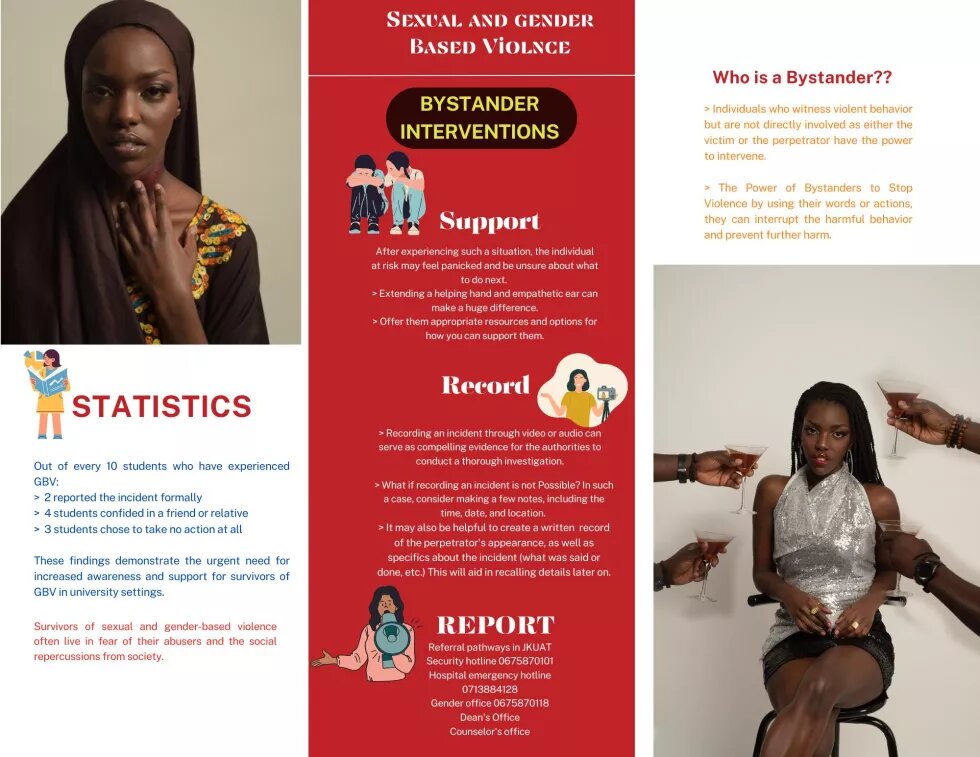Only 24% representation in national politics, less than 10% as student body presidents. Badili Africa, in collaboration with Heinrich Boll Foundation, tackles this gap, focusing on sexual harassment's role in hindering female leadership. Their partnership with JKUAT aims to revamp sexual harassment policies, shedding light on gaps and proposing solutions. From dissecting SGBV terminology to addressing emerging e-violence, they navigate complexities, emphasizing consent's paramount role. The call to action includes holistic awareness campaigns, annual training, gender desks, investigation committees, and supporting victims in creating safe spaces.

Currently, Kenya stands at 24% female representation in National politics. Unfortunately, this underrepresentation trickles down in universities where young women account for less than 10% of the student body presidents and leadership in the student government bodies across the country. A direct consequence of this has been a clear underrepresentation of women and girls’ issues at policy, legislation, and national budget levels.
Recognizing this gap, Badili Africa identified this as an untapped space to nurture the political leadership of young women and capacity build them to organize as leaders to engage with student governments and policy spaces in their Universities. Previous capacity-building sessions with female student leaders from various universities across the country revealed sexual and gender-based violence as a significant deterrent to young women's meaningful engagement in leadership spaces.
To gain a deeper understanding of the challenges young women face pursuing leadership aspirations in university student politics, we documented the journeys of different female student leaders to understand the gaps and effective ways of supporting them. Our findings exposed some gaps within the sexual harassment policies at universities that do not adequately respond to sexual harassment in student politics and leadership processes. As part of our commitment to addressing gender-based violence and creating safe and inclusive environments for female leadership, Badili Africa, in partnership with Heinrich Boll Foundation, has forged a collaboration with Jomo Kenyatta University of Agriculture and Technology (JKUAT) to review and update their sexual harassment policy, towards effectively preventing, responding to and ending sexual harassment.
Badili Africa held a two-day meeting: An inception meeting and capacity building session at the AICAD centre in JKUAT to kick start the project. In attendance were the Administrator of academic affairs, representatives from the office of the Dean of Students, the Gender Director, Sexual Harassment Committee members, the JKUAT hospital psychologist, the security department, students (student leaders, campus me too champions, peer counsellors), and other crucial stakeholders in the referral pathway. The participants were strategically selected as they are responsible for reviewing the current sexual harassment policy and also crucial in tackling SGBV at the university.
The focus of the meetings revolved around dissecting terminology on Sexual and Gender-Based Violence (SGBV), understanding the various manifestations of sexual harassment, delving into the Kenyan legal framework, addressing sexual harassment within the JKUAT specific context, exploring barriers to reporting, adopting survivor-centred approaches, and deliberating on model policy guidelines. The partcipants strongly topics including consent, impediments to reporting, and the emergence of e-violence.
E-violence was also broadly discussed as an emerging form of sexual harassment. “Is the law selective? If a text message is admissible in court, what are the parameters of evidence presented in terms of abusive content that is posted online for example on Twitter? The Evidence ACT has to be reviewed to capture such violations, however, the Computer Misuse and Cyber Crimes Act and The Data Protection Act can be used to persecute such violations”.
Addressing the challenges of reporting and gathering evidence shines a light on the complex journey survivors of sexual harassment face. Reporting obstacles arise from fears of consequences, societal stigma, and doubts about fair institutional handling. Additionally, proving instances, especially physical ones, becomes challenging due to the lack of concrete evidence, discouraging survivors from seeking justice. As one participant pointed out, even proving a public incident like a spanking is incredibly challenging. Additionally, the evident lack of confidence among students in the institution's response underscores the vital need to establish clear protocols for addressing claims and providing unwavering support to survivors throughout the process.
The concept of consent was extensively discussed, and a consensus was reached that seeking enthusiastic consent is paramount. It was emphasized that consent is not merely a matter of yes or no; it must always be willingly given.
Promoting Best Practices for Institutions and Issuing a Call to Action
The panel discussions yielded a number of noteworthy best practices, as identified by representatives from Action Aid and Amnesty International:
Holistic Awareness Campaigns: Launch comprehensive campaigns to educate students about sexual harassment policies, reporting protocols, and available support services. This initiative should primarily target incoming students.
Annual Training: Conduct regular training sessions for all institution members, including staff and students. These sessions should foster awareness and nurture a culture centred around respect and consent.
Gender Desk Establishment: Create a dedicated gender desk responsible for handling sexual harassment cases, offering support, and serving as a resource hub for survivors.
Investigation Committee Formation: Establish an independent committee entrusted with promptly and effectively handling reported incidents, ensuring accountability throughout the process.
Integration of Demands: Incorporate the demands articulated by the campusmetoo campaign into the institution's sexual harassment policies. Regular monitoring of the implementation progress is crucial.
Support for Victims and Safe Spaces: Develop robust mechanisms to support victims and establish safe spaces within the institution where survivors can seek assistance and share their experiences